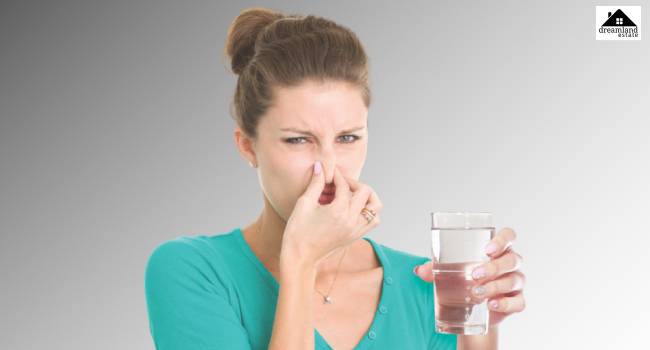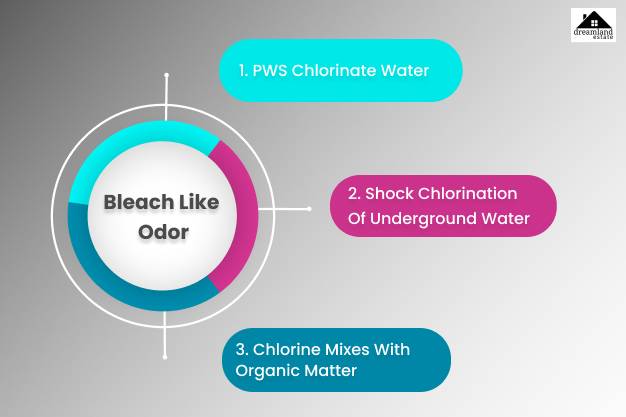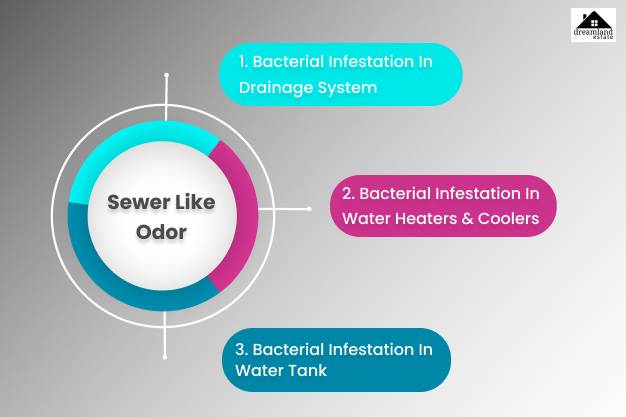How Do I Fix Smelly Tap Water? Here Are The Easy Ways

Waking up in the morning and finding a bad odor from your kitchen sink or faucet is one of the worst ways to wake up. So as the bad odor passed through my nostrils, I asked myself – where is this smell coming from, and how do I fix smelly tap water?
Smelly tap water is one of the worst things you can experience regarding your plumbing. Since water is used for many activities in our households, you need to keep it clean. In addition, you also need to keep your house water safe from pollutants.
So, how do you fix smelly tap water? Keep on reading this article to find out!
Causes Of Smelly Tap Water
The primary causes of smelly tap water can be different, depending on the type of smell you are getting. Other odors have other sources and reasons for contamination. Therefore, based on the odor, the various causes of smelly water are:
1. Bleach Like Odor

If the water from your faucet has a bleach-like smell that somewhat resembles the smell of chemicals like chlorine, then the causes of this odor are:
a. Public Water Suppliers (PWS) Chlorinate Water
All the water that gets sent to American households is managed and controlled by the Environmental Protection Agency (EPA). To make the water clean for human consumption, they add Chlorine to the water so that it gets disinfected. The EPA does this before distributing them to all households.
The EPA adds 0.3 to 3.0 parts per million (ppm) of Chlorine to the water. However, depending on the amount of bacterial or fungal infection in the pipes or the source of water for EPA, they can add as high as 5.0 ppm of Chlorine. This causes the water to smell like bleached chemicals, giving that chlorinated smell.
b. Shock Chlorination Of Underground Water Reserves
Bacterial growth in household water supplies is common after a large storm passes. It is also pretty common during the monsoon season. Therefore, the EPA conducts “shock treatment” on the water during this time.
This means that the EPA added more than usual Chlorine to the water so that you can prevent the bacterial buildup beforehand. Unfortunately, when this happens, the faucet water will smell like chlorine.
c. Chlorine Mixes With Organic Matter Inside Pipes
Since many forms of organic matter can infect the public water supply, biofilm is the most dangerous and disgusting of all. Biofilm is a very smelly and slimy mixture of various types of bacteria, algae, and fungi.
To reduce biofilm concentration in the water supply, the EPA adds lots of chlorine that kills the germs. Here, certain types of non-harmful bacteria do not die at the hands of Chlorine. Instead, it fuses with it to form Chloramines, which have a pungent, chlorine-like smell.
2. Sewer Like Odor

While Chlorine has a distinct smell, it is still somewhat tolerable. However, the smell of fecal matter is not. There might be times when the smell of tap water becomes too dirty to examine. This happens when the water gets a sewer-like smell.
The main causes of this smelly tap water are:
a. Bacterial Infestation In Drainage System
The most common reason for this bad smell is because of an overgrowth of bacteria in the drainage outlets. Organic matter like fecal matter and food waste products can get stuck on the sewer pipes. This provides an ideal space for bacteria to grow and thrive.
When bacteria grow because of such conditions, it produces a gas called Sulfur, which has an awful pungent smell. This smelly water from tap is somewhat reminiscent of rotten eggs and fecal matter.
b. Bacterial Infestation In Water Heaters And Coolers
We tend to use our geysers and water heaters a lot during winters. However, not using the heated water in its entirety and leaving it there for a few days can cause the build-up of bacteria inside the heater. Fortunately, this bacteria is not that harmful but produces smelly hot water from tap.
c. Bacterial Infestation In Water Tank
The water tank in your house or the main water supply tank from the EPA can get mixed with sewer water. Another reason is that it can have bacteria thriving in it from external sources. This is a major problem since this bacteria is difficult to remove and clean up.
3. Fuel Like Odor

Sometimes, you can get a bad odor from your tap water, which might smell like fuel like diesel. The main causes for this smelly tap water are:
a. Fuel Leakage Near Underground Water Reserves
Underground public water supply pipes might get contaminated by fuel leakage from nearby gas stations or industrial factories. The oil seeps into the underground water pipes through small cracks and contaminates the entire water flow.
b. Industrial Discharge Polluting Underground Water Reserves
Many industries and factories discharge all their wastewater into nearby rivers and ponds. There is a high chance this water can enter public water supply tanks and pipes and contaminate them.
c. Agricultural Discharge Polluting Underground Water Reserves
If you live near the city’s outskirts or in a small town with a lot of farmland, agricultural discharge in ponds and rivers is pretty common. Therefore, there is a high chance that this water can seep into public water supply tanks and pipes to make it smelly.
4. Earthy Or Fishy Odor

There is a high chance that you might get an earthy or a stinky fishy smell from your tap water. This is pretty common in rural and suburban areas of the USA. The main causes for such a smell are:
a. Decaying Organic Matter In The Drain
Since the sewer pipe outlets from your house and the public water supply water inlets are typically closer to each other. Therefore, there is a possibility that the drainage water might spill from cracks in the pipes and seep into the clean water inlet and contaminate it over time.
This can also happen because of accidental seepage or deposit of decaying organic matter in your public water supply inlet.
b. Decaying Organic Matter In The Water Tank Or Well
There is a high chance that you might have decaying organic matter stuck in your house’s water tank or public water supply pipes. These can rot over time and contaminate the water. If you live in rural areas, the well water can get contaminated this way too.
c. Well Water Pollution Due To Mix Of Surface Drainage
If you live in rural, agricultural areas, there is a high chance that surface drainage from your farm can seep into the well water. This can cause the water to get an earthy smell.
How To Fix Smelly Tap Water?

Now that you know about the various causes of smelly tap water, you must be thinking, how do I fix smelly water?
1. Locate The Source Of The Odor
If I asked myself, “how do I fix smelly tap water?” then the first task you should do is to try and locate the source of the smell. While you might have difficulty in doing so, I recommend contacting a plumber for support.
Smelly tap water is the first indication of water contamination in your water supply system. This can be either because of contamination from the main public water supply system or in your house’s water tank.
Try to have a whiff to identify the kind of smell the tap water is exuding. Then, depending on the type of smell, it can be identified what the source of the problem might be. In addition, check how many taps have that bad smell.
- If only one tap has that bad smell, then the problem might be because some decaying organic matter is stuck in the pipes leading up to that particular faucet.
- On the other hand, if the stench is coming from all the faucets, then the problem is in your water supply or your house’s storage tank.
2. Dechlorinate Your Water Supply
If you are getting a heavy, pungent smell of chlorine from your tap water, then you need to dechlorinate your water. This can be done by either dechlorinating your water supply system in your overhead tank or contacting your water supply provider.
Since the public water suppliers typically dechlorinate the water from the source, the only thing that you can do right now is to dissipate the chlorine in your tank. For this, all you need to do is keep your tap water running until the smell goes away. So even though a lot of water might get wasted here, it is the only option available to you.
If the chlorine is mixed with organic matter in the pipes of your plumbing systems or your underground well, then you need to flush out your entire water system and deep clean it from the inside. So how do I fix smelly tap water? I would recommend you hire a pump installer or a licensed well driller.
3. Shock Chlorination Treatment
Just like the public water suppliers, you can conduct shock chlorination treatment. But how do I fix smelly tap water? You simply need to add chlorine to your overhead water storage tank to do so. This is best done during the rainy season, making tanks moldy. Therefore, mold prevention techniques also work great over here.
It is best done using the help of an expert. This is because the amount of chlorine you must put in the water needs to be measured properly. Depending on the water storage capacity of your tank, the correct ppm (parts per million) of chlorine needs to be used.
3. Baking Soda And Vinegar
How do I fix smelly tap water? First, it would mean you have a seepage of drainage water in your primary clean water supply. Here, you need to check your pipes for cracks that allow the seepage to happen.
If you can fix the crack with putty, then do so. Otherwise, I would recommend replacing the entire pipe if required.
Even if you change the pipes, the smell will still remain in your water, stinking. It is also possible that the pollutants have stuck to the lines of your water pipes, faucets, and even your overhead water tank. Simply add baking soda and vinegar down the drain to disinfect it to clean this. Then, add hot water to it 12 minutes later.
3. Water Heater Issues
As mentioned before, the water in your geyser or water heater might stink during winters. To ensure that it’s the heater, you can smell both cold waters from normal taps and hot water after heating them.
If the hot water stinks, it might be because of the magnesium rod that heats the water. How do I fix smelly tap water? Let it cool by not using the heater for a few days. Alternatively, you can replace the magnesium rod with an aluminum rod.
4. Cleaning Your Water Storage Tank
Cleaning your water storage tank often will help alleviate the problems if I need to learn how do I fix smelly tap water. Cleaning it once every two months and once every month during the rainy season will alleviate the problems.
3. Contact Your Public Water Supplier
You can contact your county health department to come and test the amount of chlorine in your water. If it’s less than two ppm, the water is clean enough to drink. However, report it to the authorities immediately if it’s more than that. Until the problem gets solved, drink the water only after boiling it.
So how do I fix smelly tap water in this case? If the water has a pungent, sewage-like odor, it means that the public water supply from the source has been tainted. Contact them immediately to notify them of the problem.
Frequently Asked Questions (FAQs):
It means water contamination in your house water pipes or storage tank or from the source of public water supply.
It means your water is contaminated.
Add vinegar to your main water tank, and then open all the taps around your house. Let the water run until you do not smell vinegar anymore.
You can only bleach a house pipe by adding chlorine to your main water tank and letting the chlorinated water run through all the pipes and taps.
Conclusion
If you have got smelly tap water and constantly ask yourself how do I fix smelly tap water, then I have the perfect recommendations for you. Depending on what type of smell you are getting from the tap water – chemical, earthen, sewage-like, or fuel-like, the treatment process should be according to that.
Read Also:











Leave A Reply